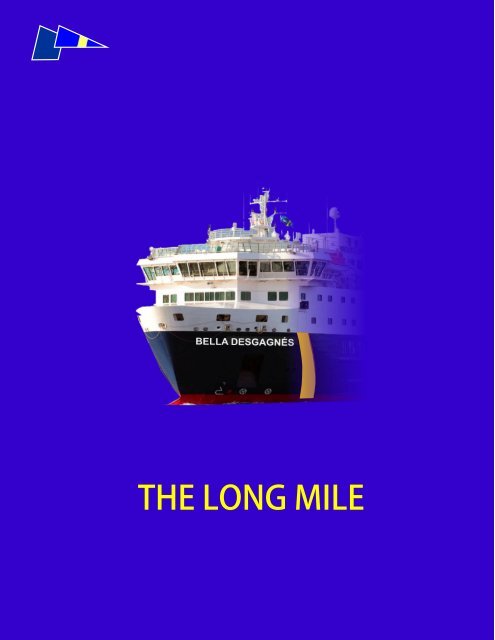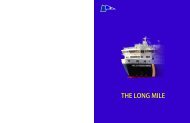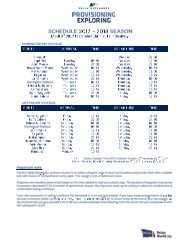The long Mile
Create successful ePaper yourself
Turn your PDF publications into a flip-book with our unique Google optimized e-Paper software.
THE LONG MILE
Mon pays ce n'est pas un pays, c'est l'hiver<br />
Mon jardin ce n'est pas un jardin, c'est la plaine<br />
Mon chemin ce n'est pas un chemin, c'est la neige<br />
Mon pays ce n'est pas un pays, c'est l'hiver<br />
Dans la blanche cérémonie<br />
Où la neige au vent se marie<br />
Dans ce pays de poudrerie<br />
Mon père a fait bâtir maison<br />
Et je m'en vais être fidèle<br />
A sa manière, à son modèle<br />
La chambre d'amis sera telle<br />
Qu'on viendra des autres saisons<br />
Pour se bâtir à côté d'elle<br />
Th e p oe m "Mon pa ys" w as com pose d in 19 6 4 b y G ille s Vi gne au lt.<br />
Vig ne au lt is a Gr a nd Officer of th e N atio na l Or de r of Qu eb ec,<br />
Kni gh t o f the Le gio n o f Ho no ur , Office r o f th e O rd r e de s Arts et<br />
de s Le ttr e s.<br />
H e w as b or n o n Octo be r 1 7, 1 92 8 in Na tash qu an .
Introduction<br />
Im August 2014 legte die „Bella Desgagnes“ an einem sonnigen Morgen am Quai des<br />
kleinen Fischerdorfes La Tabatiere an Kanadas Ostküste an.<br />
Ein alter Mann kam gemeinsam mit einer wesentlich jüngeren Frau die Gangway<br />
herunter.<br />
Er war weder ein Einheimischer, der das Schiff hier verliess, noch ein Passagier, der den<br />
sich bereits zu einem Landgang formierenden Touristen zugerechnet werden konnte.<br />
Er wechselte ein paar Worte der Begrüssung mit Paul, dem Hafenmeister und wartete,<br />
bis der Schiffskran den Gepäckcontainer mit seiner Reisetasche und eine in einem<br />
gediegenen Futteral steckende Fliegenrute vom Schiff herunterhievte.<br />
Beide standen immer noch herum, als sich alle Passagiere bereits zerstreut hatten.<br />
Lennix, einer der dockman, sagte einer dunklen Erinnerung folgend, fragend zu Paul :<br />
“Who is the guay with the lady beside, I know him, but I cannot remember his name?<br />
“Henry” , sagte Paul.<br />
“Er ist hier für ein Woche mit seiner Frau zum Lachsfischen am Mecatina.<br />
Eldon kommt von Mutton Bay und holt beide ab.”<br />
Während seine Frau dem Ent- und Beladen des Schiffwes zusah, war Henry bereits<br />
mental am Fischen. Er versuchte sich gerade, an Unterschiede beim Anbiss und Drill<br />
von Forellen und Lachsen zu erinnern, denn am Mecatina gab es nicht nur Lachse,<br />
sondern auch gelegentlich schöne Meerforellen.<br />
Nicht so gross wie die Fische, die er als junger Mann in Croatien an der Gacka gefangen<br />
hatte, aber immerhin.
He was on vacation, and quietly got out of Rijeka to drive a<strong>long</strong> the Adriatic Coast towards the<br />
South. After a few kilometres, he arrived to the top of the Bakar Bay and saw a Snack Restaurant.<br />
He stopped, had a beer and a portion of cevapcici, then he enjoyed a Slivovic and the view he was<br />
embracing from this belvedere; way below where he stood, he could see way down the village of<br />
Bakar, the quiet blue water in the bay, and in the horizon, the last minutes of the sunset.<br />
It was in 1965. In these years, having a small glass of beer was no problem, especially in good old<br />
Yugoslavia. In those days, you had to have much more to drink before the local police from Tito<br />
would stop you on the street, just to check the percentage of alcohol in the system from a few local<br />
people and a rare tourist.<br />
All the more so, as it was no secret that the policemen themselves did not know precisely how<br />
much beer and Slivovic they were consuming.<br />
He then drove down towards the end of the bay to reach Bakarac and the old tuna observation<br />
station, this formidable wood construction that was reaching high in the sky and towards the sea.<br />
He then drove through the fields and friendly landscape of the small coastal villages of Crikvenica<br />
and Novo Vinodolski, towards Kraljevica and its rich tradition shipyard, founded in 1729 by King<br />
Karl VI.<br />
He had a quick look at the shipyard, having no idea that some 50 years later, a boat with the<br />
number 555 would be built there, and that this same boat would bring him to his favourite salmon<br />
fishing place in Canada.<br />
If he would have imagined so, he would suddenly have been gone back fifty years in time, and been<br />
terribly impressed by his clairvoyant capabilities. So, he continued lightheartedly his trip as<br />
leasurely as before, until he reached Senje, the old city of the kings.
<strong>The</strong>re, he left the Küstenstrasse and engaged his small Fiat uphill in a series of abruptly winding<br />
turns. Indeed, he wanted absolutely to reach the famous lakes in Plitvice; first, to show his<br />
companion the magnificence of the site, and second, to go trout fishing in these crystal clear<br />
waters.<br />
While his little Fiat was painfully winding up these serpentine turns to the Velebit Pass, he already<br />
regretted his decision, as he was really concerned about his car making it to the top of this terrible<br />
mountain road, and also about what would then happen to him.<br />
On top of it, he could not imagine that – in addition to the shipyard in Kraljevica – he would find<br />
right in front of him something of a different nature that would influence his whole life.<br />
He finally reached, in this deep black night, the pass he was desperately <strong>long</strong>ing for, and turned<br />
into the small street without sign, which he thought could lead to Plitvice.<br />
Henry took a right turn spontaneously at the junction and drove for a good hour through the<br />
deserted village of Otocac, still hoping to reach Plitvice at one point.<br />
In the next village, a pair of teenagers was sitting around a fire on the side of the street, and waving<br />
their hands in a friendly manner to the late visitor. “Ask them if there is a hotel here”, suggested his<br />
girlfriend. He put the brakes and asked hesitantly, “Hotel?”<br />
<strong>The</strong> answer came instantly:<br />
“Ribarski Hotel”, said one of the teens, with a gesture from the hand showing the direction to go.<br />
Henry, our late driver, was immediately wide awake, as “Riba” means fish in Serbo-Croatian<br />
language.<br />
He then turned around and drove past an unnoticed sign.<br />
Henry was now standing so close as a few metres in front of a dark staircase leading to a two-story<br />
building, in which absolutely no soul seemed to move. <strong>The</strong> total quietness was only disturbed by<br />
the sound of running water in the distance, making the scene even scarier.<br />
What should he do? “Sound the horn”, replied without hesitation his practical companion after<br />
having assessed the situation.<br />
After a few assertive honk-honk, a window opened on the first floor directly over the entrance,<br />
and somebody asked us in a sleepy voice what was the matter.<br />
“No, this is not a hotel, it is a fishermen’s home”, was the detached answer.







